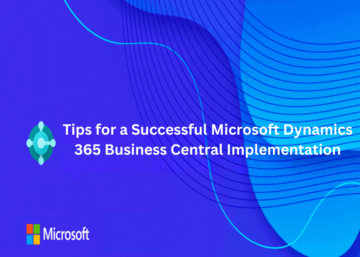Implementing or upgrading Microsoft Dynamics is a significant undertaking for any organization.
Most Australian businesses have upgraded their ERP to the latest Business Central. Choosing the right Microsoft Dynamics 365 partner is crucial to ensure the success of your project, as the right partner can help you leverage Dynamics 365 to streamline operations, enhance customer engagement, and drive growth. This comprehensive guide provides a step-by-step approach to help you choose the best Microsoft Dynamics partner for your business needs.
Step 1: Understand Your Business Needs
Before you begin searching for a Dynamics partner, it’s essential to have a clear understanding of your business needs. This clarity will guide your selection process and ensure you find a partner that aligns with your objectives. Consider the following:
i. Specific Dynamics Solution: Identify the particular Dynamics 365 modules you need, such as Sales, Customer Service, Finance, Supply Chain Management, Marketing, or Human Resources.
ii. Business Goals: Define your strategic goals. Are you looking to improve operational efficiency, enhance customer experience, increase sales, or achieve other specific outcomes?
iii. Budget and Timeline: Establish a realistic budget for the project and a timeline for implementation, including any phases or milestones.
iv. Industry-Specific Requirements: Determine any unique requirements or regulatory considerations specific to your industry, such as compliance needs in healthcare, finance, or manufacturing.
Step 2: Research Potential Partners
With a clear understanding of your needs, you can start researching potential Dynamics partners. Microsoft provides several online resources to aid in this process:
Microsoft Partner Center
The Microsoft Partner Center is a comprehensive platform to find certified Microsoft partners. Here’s how to use it effectively:
1. Access the Partner Center: Visit [Microsoft Partner Center](https://partner.microsoft.com/en-us/pcv/search) and sign in with your Microsoft account.
2. Use the Search Function: Enter keywords relevant to your requirements, such as “Dynamics 365 implementation” or “Dynamics 365 customization.” Use filters for location, industry, and partner type to narrow down your options.
3. Review Partner Profiles: Each partner’s profile provides details about their competencies, customer reviews, case studies, and certifications. Pay particular attention to partners with Microsoft Gold or Silver competencies in relevant areas, as these indicate a high level of expertise and proven success.
Microsoft AppSource
Microsoft AppSource is another valuable resource for finding partners with industry-specific solutions and apps for Dynamics 365:
1. Visit AppSource: Go to [Microsoft AppSource](https://appsource.microsoft.com/).
2. Search for Solutions: Use the search bar to find solutions that match your needs. You can filter results by industry, Dynamics 365 application, and customer ratings.
3. Evaluate Solutions and Partners: Each solution listing includes details about the partner who developed it, along with customer reviews and ratings. This information provides insights into the partner’s expertise and the quality of their solutions.
Microsoft Customer Stories
Reading customer stories can provide valuable insights into how other organizations have successfully implemented Dynamics 365:
1. Visit Microsoft Customer Stories: Go to [Microsoft Customer Stories](https://customers.microsoft.com/en-us/home).
2. Filter by Product and Industry: Narrow down the stories to those relevant to Dynamics 365 and your industry.
3. Review Case Studies: Learn about the partners involved and the results achieved. These case studies can give you a sense of the partner’s capabilities and experience.
Step 3: Evaluate Partners
After compiling a list of potential partners, evaluate them based on several key criteria:
Expertise and Experience
a. Industry Experience: Ensure the partner has extensive experience in your specific industry. Industry-specific knowledge is crucial for understanding your unique challenges and requirements.
b. Track Record: Look for partners with a proven track record of successful Dynamics 365 implementations. Ask for case studies or examples of similar projects they have completed.
c. Technical Expertise: Verify that the partner has the necessary technical skills and certifications. Microsoft Gold or Silver competencies in relevant areas are good indicators of expertise.
Customer Feedback and References
i. Customer Reviews: Read reviews on the Microsoft Partner Center and AppSource. Pay attention to feedback on project management, communication, and overall satisfaction.
ii. References: Request references from the partner and contact past clients to learn about their experiences. Ask about the partner’s responsiveness, problem-solving abilities, and the outcomes of their projects.
SAN Dynamics Technova has implemented Microsoft Dynamics 365 Business Central in organizations based in Sydney (NSW), Victoria, Brisbane and other parts of Australia and provide references to the prospects for understanding. This is another reason organizations are trusting SAN Dynamics for implementation of Microsoft Dynamics products across Australia. If you are looking for Microsoft Dynamics 365 Partner in Australia, feel free to contact SAN Dynamics Technova. You can book a quick meeting by clicking the following link: https://calendly.com/sandynamics/30min
Solution Offerings
i. Customization Capabilities: Determine if the partner can customize Dynamics 365 to meet your specific needs. Customization might include developing custom workflows, integrating third-party applications, or creating tailored reports.
ii. Integration Expertise: Check if the partner has experience integrating Dynamics 365 with your existing systems, such as ERP, CRM, or other business applications.
Cost and Value
i. Pricing: Compare the pricing of different partners and ensure it aligns with your budget. Consider not only the initial implementation cost but also ongoing support and maintenance fees.
ii. Value Proposition: Assess the value offered by the partner in terms of expertise, support, and additional services. A higher initial cost might be justified if the partner provides superior service and long-term benefits.
Support Time Zone
1. As your time zone is important to work and perform for your organization, your partner’s time zone is equally important for you so you can get support at times when required.
Microsoft partners currently serving Australian companies such as SAN Dynamics Technova are providing services in different time zones so as no customer is left uncovered.
Step 4: Make Your Decision
After thorough research and evaluation, you are ready to make your decision. Here are some final steps to consider:
1. Pilot Project: Consider setting up a pilot project to test the partner’s capabilities before committing to a long-term engagement. This can help identify any potential issues and ensure a good fit.
2. Contract Negotiation: Negotiate the contract terms, including scope, deliverables, timeline, pricing, and support. Ensure all aspects of the agreement are clearly documented.
3. Project Kickoff: Plan a detailed project kickoff meeting to align expectations, set up communication channels, and establish project governance.
Conclusion
Choosing the right Microsoft Dynamics partner is essential for the success of your Microsoft Dynamics project. By understanding your business needs, leveraging Microsoft’s online resources, and carefully evaluating potential partners, you can find a partner who will help you achieve your business objectives with Dynamics 365. With the right partner, your organization can unlock the full potential of Dynamics 365 and drive meaningful growth and transformation.
Experience partner such as SAN Dynamics Technova provide services to diverse customers across all Australia. Taking the time to research and select the best partner will pay off in the form of a successful implementation and long-term benefits for your business.
For further enquiries feel free to drop us a message at info@sandynamics.com and our experts will extend assistance with Microsoft Dynamics support.


